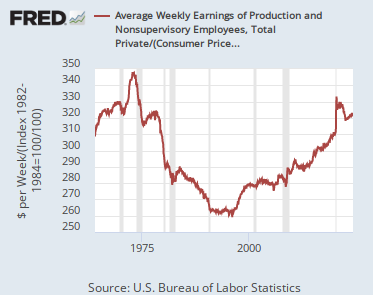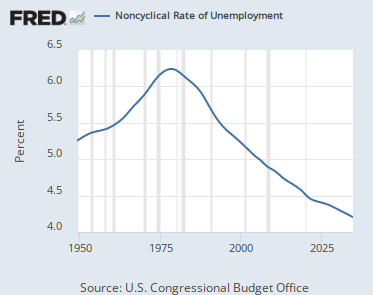- My Forums
- Tiger Rant
- LSU Recruiting
- SEC Rant
- Saints Talk
- Pelicans Talk
- More Sports Board
- Fantasy Sports
- Golf Board
- Soccer Board
- O-T Lounge
- Tech Board
- Home/Garden Board
- Outdoor Board
- Health/Fitness Board
- Movie/TV Board
- Book Board
- Music Board
- Political Talk
- Money Talk
- Fark Board
- Gaming Board
- Travel Board
- Food/Drink Board
- Ticket Exchange
- TD Help Board
Customize My Forums- View All Forums
- Show Left Links
- Topic Sort Options
- Trending Topics
- Recent Topics
- Active Topics
Started By
Message
re: 36th anniversary of Ronald Reagan firing all the air traffic controllers
Posted on 8/7/17 at 9:29 am to WhiskeyPapa
Posted on 8/7/17 at 9:29 am to WhiskeyPapa
quote:
But after adjusting for inflation, today’s average hourly wage has just about the same purchasing power as it did in 1979, following a long slide in the 1980s and early 1990s and bumpy, inconsistent growth since then. In fact, in real terms the average wage peaked more than 40 years ago: The $4.03-an-hour rate recorded in January 1973 has the same purchasing power as $22.41 would today."
This is terrible reporting from the point of view of explaining economics. Real wages/earnings represent production. With unions being highly prevalent in the 1970s and creating market distortions, a higher real wage would be natural, due to bargaining power. Yet, Regan fighting unions--among other policies--led to a marked decrease in the natural unemployment rate. And isn't that what is really being argued here--long-term effects?
Look at the real wages graph below. Are real wages falling during this time? Yes. But why are they falling. Wages are supposedly sticky or rigid, which makes us wonder how a real wage can fall. It's likely due to the decrease in union membership (from 20.1% at the start of his tenure to 12.3% by the end of his tenure.)

Also, during his tenure, RGDP grew by about 34%. You don't invoke high levels of RGDP growth by increasing nominal wages, nor do you do it by restricting labor markets--as unions would do. The reduction in unions along with greater capital flows increased production.
Lastly, and to add to the above, notice what happened to the natural rate of unemployment. Since the 80s, it has been sharply reduced. You likely don't get that kind of reduction with more unionization. In fact, you'd be hard pressed to get it as unions restrict labor markets. And that's the whole point. As labor markets loosened, more people were able to access work, more production ensued and the great prosperity of the 90s happened. Arguing that real wages (when adjusting for inflation) are stagnant ignores the long run and the whole concept of money neutrality.

Posted on 8/8/17 at 6:38 am to Jyrdis
quote:
This is terrible reporting from the point of view of explaining economics. Real wages/earnings represent production. With unions being highly prevalent in the 1970s and creating market distortions,
That is what they are for.
Popular
Back to top
 1
1





